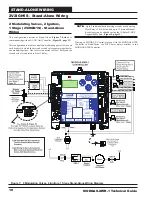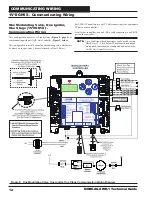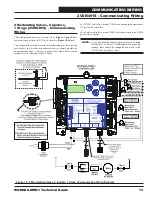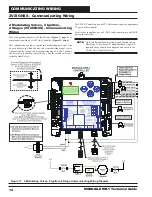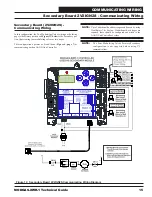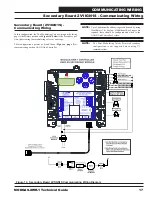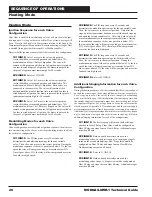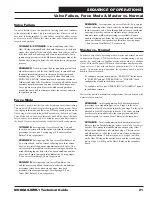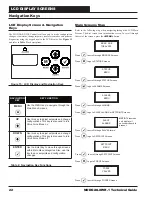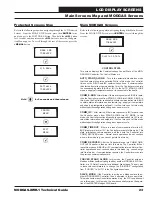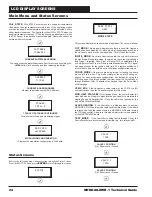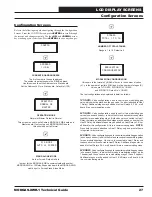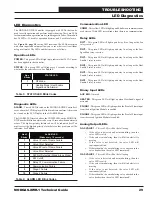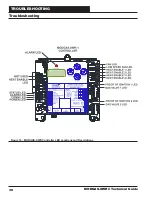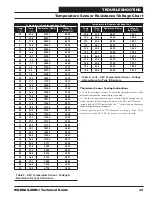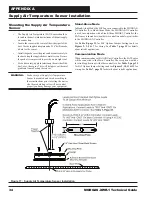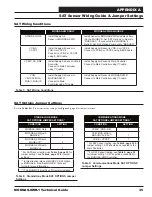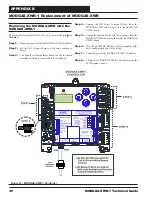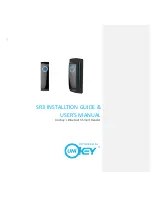
MODGAS-XWR-1 Technical Guide
SEQUENCE OF OPERATIONS
21
Valve Failure, Force Mode & Master vs. Normal
Valve Failure
If a valve failure occurs, the board fails that stage and then continues
to the next available stage. This is to make sure that if there is a call for
heat, heat is being supplied. A valve failure consists of either a valve
no detect or a proof of fl ame fail. Here is what valve failures look like
for each confi guration:
1V1IGN1S / 2V1IGN1S
: If the modulating valve fails,
Heat 1 Relay is turned off and the board then moves to the fi xed
stages (if available). If the valve fails when there is fi rst a call for
heat, then the fi rst fi xed stage will come on immediately. Every
ignition retry period (set in the hidden confi gurations menu), the
board will re-attempt to detect the valve(s) and retry the ignition
process.
2V2IGN2S
: If the fi rst stage (the fi rst modulating valve) fails
when there is fi rst a call for heat, Heat Relay 1 is turned off and
the board immediately moves to the second stage (the second
modulating valve). If the fi rst stage fails when the board is in
MODULATE_MODE, then normal board operation continues.
If the second stage fails, Heat Relay 2 is turned off and the board
continues normal operation and moves to the fi xed stages next.
Every ignition retry period (set in the hidden confi gurations
menu), the board will re-attempt to detect the valve(s) and retry
the ignition process.
Force Mode
This mode is used to test that the valve fi ring sequence is functioning.
This mode is NOT meant to replace heating mode by any means. There
is no staging in this mode, and there is no PID Loop running in this mode.
Once a stage is forced on through the Force Screen, the board will enter
Force Mode and will not leave this mode until all the stages that were
forced on have been turned off or 10 minutes pass with no user input to
the board. Here is what force mode looks like for each confi guration:
1V1IGN1S
: Forcing stage 1 forces Heat Relay 1 on, and
then the next screen allows the option to decide the modulation
percentage for the valve. Forcing stages 2-4 on forces Heat
Relays 2-4 on, respectively.
2V2IGN2S
: Forcing stage 1 & 2 on forces Heat Relays 1 &
2 on, respectively, and the screens following each force screen
allow you to select the percent modulation for each valve. The
valves are able to modulate at diff erent percentages, but keep in
mind that bringing one below the low speed cutoff and another
above it will cause low speed relay diffi
culties. Forcing stages
2-4 on forces Heat Relays 2-4 on, respectively.
2V1IGN1S
: Forcing stage 1 on forces Heat Relay 1 on,
and the next screen allows the option to select the modulation
percentage (since both valves are one stage, they both
modulate at the same percentage). Forcing stages 2-4 on
forces Heat Relays 2-4 on, respectively.
2V2IGN1S
: Forcing stage 1 on forces Heat 1 & 2 on, and the
screens following allow you to select the modulation percentage
for the respective valve. Even though both valves are considered
one stage, since they operate on separate relays, the option to
modulate them at diff erent percentages is available. Keep in
mind that bringing one below the low speed cutoff and the other
above it will cause low speed relay diffi
culties. Forcing stages
3-4 on force on Heat Relays 3-4, respectively.
Master vs. Normal
In order to help clarify operating modes, master and normal are used
to denote two Modgas XWR boards that are communicating with one
another (i.e. one board is a Modbus master and the other is a Modbus
slave). With one Modgas XWR board, the maximum number of modu-
lating valves is 2, but with two boards the maximum is 4 (2 for each
board). In a master/normal operation, the secondary board is a slave
board to the master board.
To confi gure a master board, put the “S/A MODE” for the board
to “FORCED” and put “OPERATION” to “MASTER” (both
confi gurations found in the hidden screens).
To confi gure a slave, put “OPERATION” to “NORMAL” (found
in the hidden screens).
Here are the possible modulation confi gurations that can be used with
a master/slave operation:
2V2IGN2S
: In this confi guration, both boards utilize both
heat relays for a modulating gas valve. Stage 1 is the valve
attached to Heat 1 Relay for both boards, and stage 2 is the valve
attached to Heat 2 Relay for both boards. The valves on both
boards are always modulated to the same position, and both
boards stage up (i.e. turn on Heat 2 Relay) at the same time.
2V1IGN1S
: In this confi guration, both boards utilize Heat 1
Relay to turn on 2 modulating gas valves (a total of 4 for the two
boards). This means that each board has an open relay (Heat 2
Relay) for an additional on board fi xed stage. The two valves
on both boards (i.e. all of the 4 valves) are always at the same
modulation position. The fi rst stage up (i.e. stage 2) will fl ip
on the Heat 2 Relay on the master board, and the second stage
up (i.e. stage 3) will fl ip on the Heat 2 Relay on the secondary
board.




